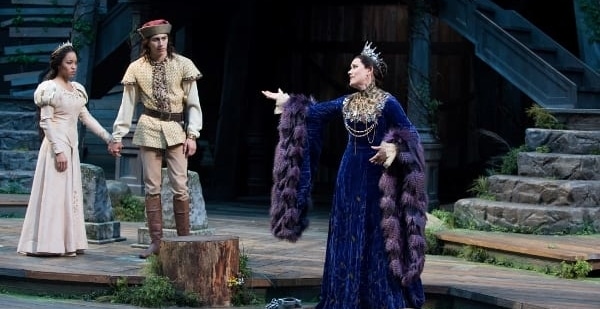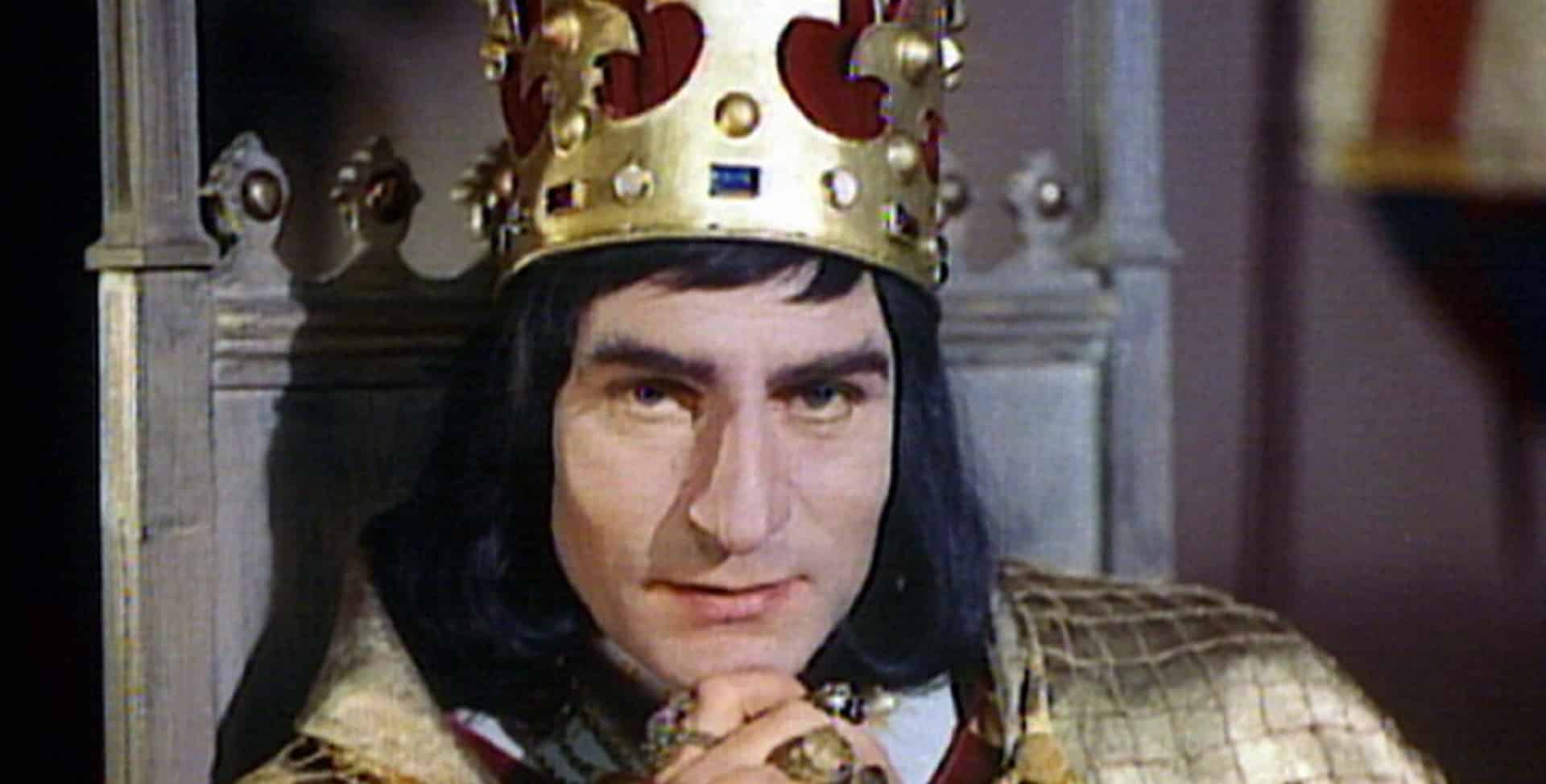This article looks at Shakespeare villains across all of his plays, and lists 10 of the very best (or should that be worst?).
Let’s start by asking whether there really are heroes and villains in Shakespeare’s plays. These concepts suggest that someone can be all good, noble, and well-intentioned on the one hand, or all bad, ill-intentioned, and downright evil on the other. What makes Shakespeare’s characters so interesting is that they are human beings, motivated by the things that motivate human beings: they react to their circumstances and to people in different ways. One man can, like Macbeth, be both ‘hero’ and ‘villain,’ responding to the conditions he is faced with as they change.
As one can imagine, Shakespeare’s plays raise the question of what a villain is so to present a list of villains is not a clear-cut task. For example, some lists have Shylock from The Merchant of Venice on them, but in some ways of looking at it he is very much a victim rather than a villain. For these more ambiguous characters we’ve put together this list of Shakespeare’s most misunderstood bad guys.
All Shakespeare villains act in cruel and unpleasant ways. Some of them kill, deceive and otherwise take advantage of their fellow men and women, but they are all only human beings. This list of Shakespeare villains catalogues ten of the most badly behaved of those human beings in Shakespeare’s plays:
The Queen, Cymbeline

Robin Goodrin Nordli shines as the wicked Queen; part Lady Macbeth, part Snow White’s evil stepmother.
The Queen in Cymbeline is a character Shakespeare doesn’t even name, but she is without a doubt one of his top villains. Cymbeline is her second husband and she has a son, Cloten, whom she is determined to marry off to Cymbeline’s daughter, Imogen. She pursues this ambition with ruthless energy and will stop at nothing, including murder.
Angelo, Measure for Measure
Angelo in Measure for Measure is a particular kind of Shakespeare villain who is hated by women. Left in charge of administering Vienna while the Duke is away, he adopts a strict approach. Determined to stamp out fornication he imprisons and executes people who conduct sexual affairs outside of marriage. When Claudio falls victim his sister Isabella, a beautiful young nun, goes to him to beg for mercy. He agrees not to execute Claudio if she agrees to sex with him. In spite of her pleading he sticks to that line right to the end. His villainy consists mainly of his incredible hypocrisy. As time goes on he appears increasingly villainous as a result of the development of society’s attitude to women.
Lady Macbeth, Macbeth

Erika Sunnegårdh gets crazy as Lady Macbeth at Glyndebourne
Lady Macbeth has always been seen as the most villainous of Shakespeare’s women and portrayed in paintings as a sharp-featured, black-haired woman with a hard expression. Like all of Shakespeare’s ‘villains’, she is just a character confronted with the choices that are offered her. In her case, her husband has written to tell her about the three witches who have predicted that he will be king. At that very moment, a messenger arrives to tell her that the king is coming to their castle to spend the night with them.
To her, to advance her and her husband’s ambitions, the logical thing is to kill the king while he is there. She urges Macbeth to kill him, using several tactics, including questioning his manhood, his love for her, his intentions about becoming king, and after a lot of soul searching and hesitation, he goes ahead with it. Afterward, she gives him moral support in the actions he takes to maintain his position as king. She eventually cracks up and commits suicide.
Regan, King Lear

David Tse Ka-shing’s English and Mandarin King Lear mashup
Regan in King Lear is Lear’s second daughter. After having been given half of all Lear’s lands and wealth after his decision to retire she turns on him and behaves cruelly towards him. She ties Lear’s old friend, Gloucester, to a chair, accusing him of supporting her father, and she pulls his eyes out onstage.
Claudius, King Lear

Patrick Stewart as Claudius
Claudius in Hamlet is Hamlet’s uncle. He murders his brother, the King of Denmark, who is Hamlet’s father. He immediately swindles Hamlet out of his inheritance, marries his mother and assumes the throne. Noticing that Hamlet is on to him he employs some of Hamlet’s college friends to spy on him. He plots to have Hamlet murdered on a ship at sea. When Hamlet escapes that he plots to have him killed during a duel. The plan goes wrong and he ends up killing, not only Hamlet but his wife Gertrude, Hamlet’s mother, Laertes, the son of his senior courtier, Hamlet, and himself. Even by Shakespeare villain standards that’s a large haul of bodies!
Macbeth, Macbeth

Michael Fassbender as Macbeth
Macbeth, adored by everyone and, trusted by the king, Duncan, is a fearless warrior in the king’s service, but after killing Duncan he continues his murderous career, killing all those who oppose him, including his closest friend, Banquo. At the very center of the play, on his orders, a child is murdered. The killing of Duncan takes place offstage but the child’s slaughter is onstage. The effect of that is to shock the audience and draw its attention to how far Macbeth has sunk into villainy, and how ruthless he has become. His decline into this kind of villainy is due to his ambition, and, hearing only the advice he wants to hear, he makes the mistakes that lead to his downfall.
Tamora, Titus Andronicus

Jessica Lange as Tamora
Tamora in Titus Andronicus is the queen of the Goths. She is captured by Titus and forced to plead for the life of her son, who is nevertheless murdered by Titus’ sons. As she plots her revenge, using her lover Aaron the Moor as her heavy, we see her relishing the violence to come. When Aaron describes the extreme violence he is planning she exclaims: ‘Ah, my sweet Moor!’ She instructs her sons to rape Titus’s daughter, Lavinia, and to kill her husband. When Lavinia begs to be killed instead, appealing to her as a woman to a woman, Tamora tells her sons: ‘use her as you will: the worse to her the better loved of me.’ Lavinia calls her ‘a beastly creature.’
Aaron, Titus Andronicus

Aaron at the gallows
Aaron the Moor in Titus Andronicus is about as villainous as anyone could be. The lover of Tamora, he helps her get revenge on the Andronicus family. It’s never clear what his motives are and it seems that he enjoys violence for its own sake. He doesn’t think twice about instigating rape, mutilation, and murder, running amock among the Andronicus family.
Richard III, Richard III

Lawrence Olivier on-screen as Richard III
Richard III is an interesting case of a character being both the main protagonist and the villain. The Shakespeare character is not the same as the historical Richard: he is a mixture of the propaganda surrounding the historical Richard and the creative imagination of Shakespeare.
In the play Richard addresses the audience directly and says ‘I am determined to prove a villain and hate the idle pleasures of these days.’ In spite of that and in spite of his misbehaviour, the audience likes him, taken in by his sparkling language, his logical arguments, his soliciting of the audience’s sympathy regarding his physical disability and his selfish motives, with which the audience can identify. As he pursues his crimes, however, the audience begins to be uncomfortable, and by the end of the play, Shakespeare makes us see what a monster he is. He gets his brother locked up in the Tower of London, he seduces Anne Neville and persuades her to marry him even though he has murdered her husband and her father and he has two of his nephews beheaded. He also eliminates all opposition.
Iago, Othello

Kenneth Brannagh as Iago in Othello – Shakespeare villain #1?
Iago, in Othello, is probably the most destructive of Shakespeare’s characters. He destroys several people’s lives during the course of the play, including several careers, and two deaths, through the manipulation of everyone around him. His motives are complex and one is never really sure what they are. He sometimes gives an explanation for his behaviour but it changes and none of it rings true. He is charming and he is liked and respected by everyone and they all refer to him throughout as ‘honest Iago,’ but he is filled with hatred and contempt for everyone. He is very much what we would call a psychopath today. He deserves the top place in this list of villains because he is not simply responding but actively going out to destroy others’ lives.
And that’s your lot for Shakespeare villains. What did you think – any that shouldn’t be there, or any other characters not on the list you think should have made the cut? Let us know in the comments section below!
Shakespeare villain FAQs
Who is Shakespeare’s ‘worst’ villain?
Iago, in Othello, is probably the most destructive of Shakespeare’s characters. He destroys several people’s lives during the course of the play, including several careers, and two deaths, through the manipulation of everyone around him. His motives are complex and one is never really sure what they are. He sometimes gives an explanation for his behaviour but it changes and none of it rings true. He is charming and he is liked and respected by everyone and they all refer to him throughout as ‘honest Iago,’ but he is filled with hatred and contempt for everyone. He is very much what we would call a psychopath today.
Who are the 10 biggest villains in Shakespeare?
Iago (Othello), Richard III (Richard III), Aaron (Titus Andronicus), Tamora (Titus Andronicus), Macbeth (Macbeth), Claudius (King Lear), Regan (King Lear), Lady Macbeth (Macbeth), Angelo (Measure for Measure), The Queen (Cymbeline).





Shakespeare villains is very interested
This was excellent! Well done. More work like this, please.
I don’t really like it to be fair